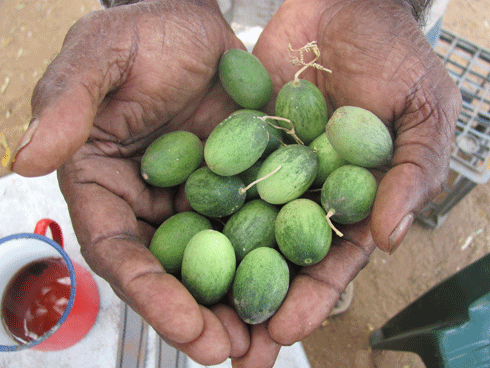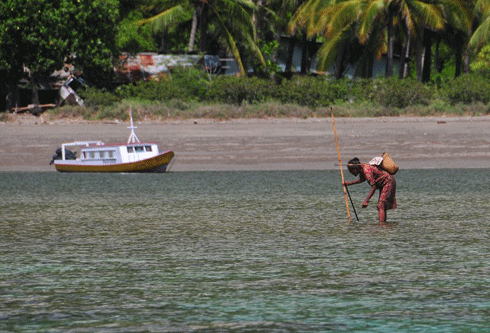
|
Published: 14 February 2013
Love what they do: Science with a Heart
A legendary humanitarian, the 14th Dalai Lama of Tibet, is a great fan of modern science. ‘I personally like to imagine all human activities, including science,’ he has said, ‘as individual fingers of a palm. So long as each of these fingers is connected with the palm of basic human empathy and altruism, they will continue to serve the well-being of humanity.’

|
|
‘Mundupan’ or bush cucumbers being harvested from the Daly River area, Northern Territory. Scientists have been assisting Aboriginal communities to better manage their lands for future generations. See Land management tool based on Indigenous knowledge Credit:
Emma Woodward, CSIRO
|
Today CSIRO is celebrating research with a social conscience – science that improves lives, especially the lives of those disadvantaged by poverty or ill-health. Economists refer to it as ‘corporate social responsibility’. At CSIRO, we call it ‘Science with a Heart’.
ECOS has pulled together a selection of recent stories highlighting the humanitarian face of science (see below).
If you’re mood is more romantic than reflective, declare your love for science through the CSIRO ‘Science with a Heart’ poetry competition.
-
Land management tool based on Indigenous knowledge: CSIRO’s Emma Woodward worked with Aboriginal elders in a research program to develop six seasonal calendars from six different language groups from the Northern Territory and Western Australia.
-
A best-seller’s enduring scientific legacy: In 2012, the world celebrated the 50th anniversary of the revolutionary book, Silent Spring, written by marine biologist and environmental advocate, Rachel Carson. Two CSIRO scientists talk to ECOS about how Rachel Carson’s book shaped their research interests and commitment to the environment.
-
Bronwyn Harch, using maths to solve the planet’s big issues: The Chief of CSIRO Mathematics, Informatics & Statistics talks to ECOS about her passion for using maths to study the environment, the challenges of her new role as CSIRO’s maths science leader, and her mission to inspire the next generation of multi-disciplinary scientists.
-
The deeper riches of river country: At Nauiyu Nambiyu on the Northern Territory’s Daly River, Ngan’gi-speaking people observe the signs of Wirirr marrgu, or 'burn grass season'. Elder, Patricia Marrfurra McTaggart, says when the wet season ends, people go out harvesting fish, pig-nosed turtle, long-necked turtle, snapping turtle, echidna, rock python and water lilies. It is, she says, a season of plenty.
-
‘Printed power’ to light the world’s darkness?: CSIRO scientist, Scott Watkins, says that in too many parts of the world, grid-connected electricity remains an unattainable luxury. But the latest solar cell technology, flexible solar cells based on thin plastics, heralds a new generation of ultra-low-cost lighting for poor communities in remote areas.
-
Strong links to land deliver better Indigenous health outcomes: For Aboriginal communities in inland Australia, connections with land can help them achieve a better state of health, says Dr Jocelyn Davies of CSIRO Ecosystem Sciences.
-
Watch a fascinating video produced by CSIRO on Aboriginal water values and management in northern Australia.




